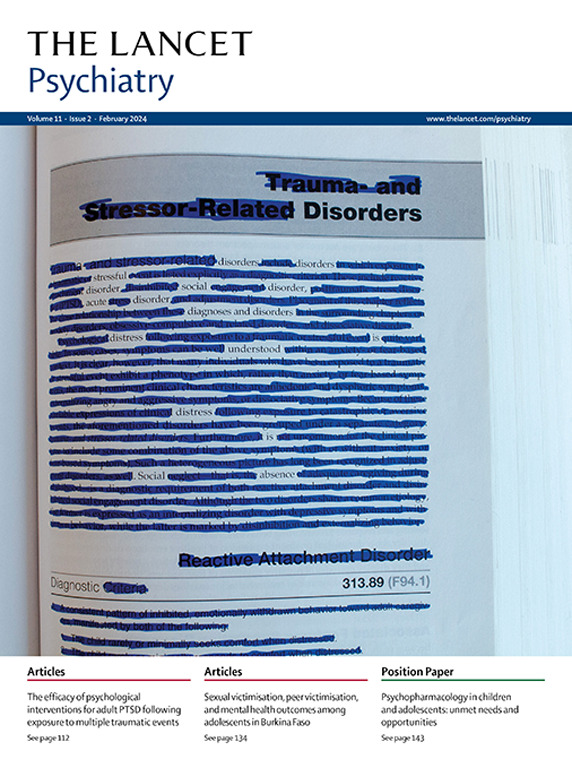Evaluating the global landscape of suicide helpline services: a global survey across 105 countries
IF 30.8
1区 医学
Q1 PSYCHIATRY
引用次数: 0
Abstract
Background
Suicide helpline services (SHSs) are viewed as an essential part of suicide prevention. In the context of increased demand experienced by the services through the COVID-19 pandemic, as well as reduced funding, we aimed to evaluate such services to help assess their effectiveness and resilience.Methods
This multinational cross-sectional survey, conducted from Sept 1, 2022, to Feb 28, 2023, evaluated SHSs in 150 countries. Local collaborators created an SHS directory, and a 42-question questionnaire was distributed via Survey Monkey through Find A Helpline and local collaborators. A team of experts, including individuals with lived experience, helped shape the research questions and study design. We did descriptive statistical analysis of answers to the questions, and data were further analysed using the Bayesian Model Averaging method to predict managers’ or supervisors’ low overall satisfaction with the service (MS-LOSS).Findings
The study involved 446 responses from 105 countries for descriptive statistics. 354 (79·4%) of 446 services had insufficient funding, 249 (55·8%) had post-COVID-19 budget reductions, and 278 (62·3%) observed a sharp rise in suicide help requests during the COVID-19 pandemic. 420 responses were used for finding the optimal logistic model, which had an area under the curve of 0·679, indicating that pre-service training for volunteers was significantly associated with a reduction in MS-LOSS (odds ratio 0·16 [95% CI 0·07–0·31]; p<0·001), as was having a quality assurance structure (0·15 [0·02–0·70]; p=0·030). Higher MS-LOSS was associated with staff training only every 2–3 years instead of one or more times per year (2·87 [1·23–6·85], p=0.016) and with dilemmas with providing services in severe cases (1·68 [1·06–2·68]; p=0·028).Interpretation
Global SHS reports indicate that both pre-task and ongoing training for volunteers and staff, coupled with a quality assurance structure, could decrease MS-LOSS. Our findings emphasise the need for training for volunteers, continuous training programmes for staff, and on-site support for individuals at risk of suicide.Funding
RSTMH Small Grants Award 2021, UK NIHR, and MEXT.评估自杀求助热线服务的全球格局:一项覆盖105个国家的全球调查
背景自杀热线服务被视为预防自杀的重要一环。在COVID-19大流行期间服务需求增加以及资金减少的背景下,我们旨在评估这些服务,以帮助评估其有效性和复原力。这项跨国横断面调查于2022年9月1日至2023年2月28日进行,评估了150个国家的SHSs。当地合作者创建了一个SHS目录,并通过“寻找帮助热线”和当地合作者通过“调查猴子”发放了一份包含42个问题的问卷。一组专家,包括有生活经验的人,帮助塑造研究问题和研究设计。我们对问题的答案进行了描述性统计分析,并使用贝叶斯模型平均法对数据进行了进一步分析,以预测经理或主管对服务的低总体满意度(MS-LOSS)。研究结果对105个国家的446份反馈进行了描述性统计。446个服务机构中有354个(79.4%)资金不足,249个(55.8%)在COVID-19大流行后预算减少,278个(62.3%)在COVID-19大流行期间观察到自杀帮助请求急剧上升。420份回复被用于寻找最优logistic模型,曲线下面积为0.679,表明志愿者的职前培训与MS-LOSS的降低显著相关(优势比0.16 [95% CI 0.07 - 0.31];P< 0.001),质量保证结构(0.15 [0.02 - 0.70];p = 0·030)。较高的MS-LOSS与员工仅每2 - 3年培训一次而不是每年培训一次或多次相关(2.87 [1.23 - 6.85],p=0.016),严重情况下提供服务的困境相关(1.68 [1.06 - 2.68];p = 0·028)。全球SHS报告表明,对志愿者和工作人员的任务前培训和持续培训,加上质量保证结构,可以减少MS-LOSS。我们的研究结果强调需要对志愿者进行培训,对工作人员进行持续培训,并对有自杀风险的个人进行现场支持。资助2021年grstmh小额赠款奖,英国国家卫生研究院和next。
本文章由计算机程序翻译,如有差异,请以英文原文为准。
求助全文
约1分钟内获得全文
求助全文
来源期刊

Lancet Psychiatry
PSYCHIATRY-
CiteScore
58.30
自引率
0.90%
发文量
0
期刊介绍:
The Lancet Psychiatry is a globally renowned and trusted resource for groundbreaking research in the field of psychiatry. We specialize in publishing original studies that contribute to transforming and shedding light on important aspects of psychiatric practice. Our comprehensive coverage extends to diverse topics including psychopharmacology, psychotherapy, and psychosocial approaches that address psychiatric disorders throughout the lifespan. We aim to channel innovative treatments and examine the biological research that forms the foundation of such advancements. Our journal also explores novel service delivery methods and promotes fresh perspectives on mental illness, emphasizing the significant contributions of social psychiatry.
 求助内容:
求助内容: 应助结果提醒方式:
应助结果提醒方式:


